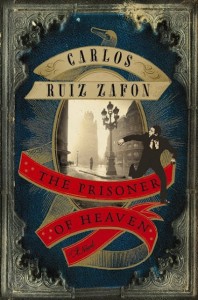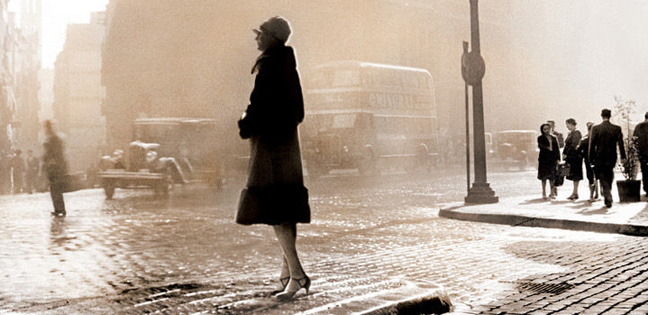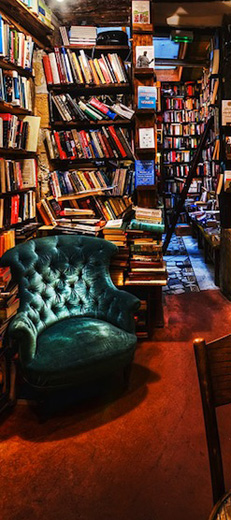
The Prisoner of Heaven
By Carlos Ruiz Zafón
Hardcover
Pages: 288 pages
Publisher: Harper
Release Date: 07/10/12
ISBN: 0062206281
I feel it only appropriate to begin this review with a note mentioning that Carlos Ruiz Zafón’s The Shadow of the Wind (REVIEW) is my favourite novel. I say this because it presents an inherent bias in me that won’t necessarily exist for the average reader, and is a double-edged sword in terms of setting up my expectations and, ultimately, determining this review of The Prisoner of Heaven, the first true sequel to The Shadow of the Wind, after 2009’s The Angel’s Game.
This bias worked against The Angel’s Game (REVIEW). My anticipation for the novel was sky-high, having first read The Shadow of the Wind only a few months earlier, I was desperately eager to spend more time in Zafón’s version of Barcelona, with his characters that I loved dearly. The bar was set impossibly high and, as the old adages often do, “the higher they are, the farther they fall” proved too true. My initial review of The Angel’s Game was positive (and I still think positively about the novel), but on reflection the flaws can’t be ignored and, as a follow-up to The Shadow of the Wind, The Angel’s Game was a disappointment. It stands to reason, then, that my expectations for The Prisoner of Heaven would be tempered somewhat. But, no. That little squealing fanboy in me couldn’t help but put Zafón’s latest novel on a pedestal, well before it ever hit store shelves. So, keep that in mind. I’m not to be trusted. For a bias is a wicked beast in the mind of a critic.
Rest now, my friend. Heaven can wait. And hell is too small for you.

With that out of the way, I can say with confidence that The Prisoner of Heaven is a superior novel to The Angel’s Game, a more approachable and engaging narrative, and a worthy follow-up to The Shadow of the Wind.
“[P]lease, I beg you, stop farting like that, because I’m beginning to hallucinate and in my dreams I see Comrade Joseph Stalin doing the charleston.”
At once a sequel to The Angel’s Game and both a sequel and prequel to The Shadow of the Wind, The Prisoner of Heaven continues to tie together the twisting and melancholy narratives of David Martín and Daniel Sempere. This time, Zafón uses the unlikeliest of sources to accomplish this intertwining of narratives: at the heart of The Prisoner of Heaven, though not the titular prisoner itself, is Fermín Romero de Torres, and his story, from his first steps through the gates at Castle Montjuïc, to his eventual meeting with Daniel Sempere, is surprisingly heartbreaking and and important to the overall narrative of the series’ overall story.
In The Shadow of the Wind, Fermín’s role as sidekick often fell into the role of comedic relief, allowing Zafón to break the tension with a well-timed joke about flatulence or an off-beat observation about the world, or those who people it. His place in the novel is important for helping to maintain tone, and showcasing Zafón’s sly humour, but the reader always had the sense the Fermím’s past held secrets as dark and interesting as anyone else in the novel. The Prisoner of Heaven explores some of those secrets, but not all. In response to Fermín’s upcoming nuptiuals, Daniel sets out to ensure that his friend can be legally wed under his nom de plume, Fermín Romero de Torres, and in doing so discovers secrets about his own past and his connection with David Martín, lightly touched upon in The Angel’s Game. It’s a thrilling ride for anyone who has closely followed the labyrinth of relationships that Zafón has woven through his novels.
[D]eep down we’ve never been who we think we once were, and we only remember what never happened …
One aspect that surprised me is how The Prisoner of Heaven makes The Angel’s Game a stronger novel, by exploring David Martín from the perspective of an outsider. It’s difficult to go into without digging deep into spoiler territory, which is not my objective for this review, but it sheds a lot of light on Martín’s actions in The Angel’s Game and explicitly explains the origins of his delusions, suggesting that the confusing narrative of The Angel’s Game, often considered one of its flaws when considering it as a stand-alone novel, might serve a greater role in the series as a whole. I have one prediction for the final novel that, if it comes true, will be incredibly bold and perfectly executed by Zafón. Time will tell if I’m correct, but it will make subsequent re-reads of the entire series take on a new perspective.
Again, Zafón proves to be a master at revealing rich, full characters in the span of only a couple of paragraphs. One of my favourite examples comes about a quarter of the way through the novel, when the reader is first introduced to Mauricio Valls, writer, governor, bully and self-proclaimed god.
Normally, after Sunday mass, the governor addressed a few edifying words to the prisoners. All they knew about him was that his name was Mauricio Valls and that before the war he’d been an aspiring writer who worked as secretary and errand-boy for a well-known local author, a long-standing rival of the ill-fated Don Pedro Vidal. In his spare time Valls penned bad translations of Greek and Latin classics and, with the help of a couple of kindred souls, edited a cultural pamphlet with high pretensions and low circulation. They also organised literary gatherings in which a whole battalion of like-minded luminaries deplored the state of things, forecasting that if one day they were able to call the shots, the world would rise to Olympian heights.
His life seemed destined for the bitter, grey existence of mediocrities whom God, in his infinite cruelty, has endowed with delusions of grandeur and a boundless ambition far exceeding their talents. The war, however, had recast his destiny as it had that of so many others, and his luck had changed when, in a situation somewhere between chance and fortune-hunting, Mauricio Valls, until then enamoured only of his own prodigious talent and exquisite refinement, wedded the daughter of a tycoon whose far-reaching enterprises supported much of General Franco’s budget and his troops.
Valls lies at the heart of the novel, and Zafón continues to explore his nature, defined by his relationships with the various criminals housed in Montjuïc prison, but the foundations of his damaged and petulant psyche are laid our fully in those two paragraphs. It’s a difficult feat for a writer to do, introducing readers so quickly to such intricate characters, but Zafón does it regularly and with seeming ease.
 And, of course, there are the familiar characters that we all met and grew to love in The Shadow of the Wind. Fermín, of course, plays an important role, as does Daniel, though his next time to truly shine will be in the following novel, but it was pleasent and nostalgic to again be re-introduced to Bea and Daniel’s father, and Issac at the Cemetery of Forgotten Books, all of whom have grown up a bit, matured and evolved since we last saw them. Except Isaac; he never seems to change. And that’s just fine.
And, of course, there are the familiar characters that we all met and grew to love in The Shadow of the Wind. Fermín, of course, plays an important role, as does Daniel, though his next time to truly shine will be in the following novel, but it was pleasent and nostalgic to again be re-introduced to Bea and Daniel’s father, and Issac at the Cemetery of Forgotten Books, all of whom have grown up a bit, matured and evolved since we last saw them. Except Isaac; he never seems to change. And that’s just fine.
Barcelona, too, has changed since readers last visited, slowly crawling out from under the shadow of World War II and the civil war that wracked much of Spain through the latter-half of the ’30s. Gone is the baroque and ethereal Barcelona, ripe for the lingering ghosts and haunted dreams that formed much of the core tale in The Shadow of the Wind, replaced with a more contemporary Barcelona, snow falling over the city, instead of sunshine bleaching its streets. Due to the dual-timeline structure of the narrative, Zafón is able to press these two visions of Barcelona together, illustrating the cities transformation through the intervening years between the ‘beginning’ of Fermín’s tale (1939) to the opening pages of this tale (1957). It’s another touching love letter from Zafón to the City of Counts.
The Prisoner of Heaven is a near pitch-perfect novel.
The Prisoner of Heaven is a worthy follow-up to The Shadow of the Wind and everything I hoped The Angel’s Game would be. It is not as deep or labyrinthine as The Shadow of the Wind, by virtue of its length, and it does not play tricks on the reader through a twisted, unreliable narrator like The Angel’s Game (or does it?), but stands between the two of them as a strong novel that, while it doesn’t stand entirely on its own, as the previous two novels did, appears to be the keystone novel in Zafón’s series. Many questions are raised in The Prisoner of Heaven, pondering the relationship between the tales of Daniel Sempere and David Martín, and the final volume of the quartet, along with those answers, cannot come soon enough. The Prisoner of Heaven is a near pitch-perfect novel, and fans of The Shadow of the Wind have much to look forward to.

I loved The Shadow of the Wind, and I didn’t realize there was a sequel. Now I’ll have to purchase all three. I love Zafrón’s prose and Fermín was one of my favorite characters; he was so tragic, yet he found his solace in humor. I’m so delighted Zafrón devoted an entire novel to him. This will be at the top of my to-read list.
Thank you!
If you enjoyed that aspect of Fermín’s character, you’ll love The Prisoner of Heaven.
After reading The Rose of Fire last night, I’m excited to begin The Prisoner of Heaven tonight. I’ve been looking forward to this one for a long time so I’m glad to hear that you enjoyed it as much as you did. I’m hopeful that I’ll enjoy just as much. Thanks for the review.
I need to re-read WIND, then read GAME, to begin HEAVEN. FML. At least they will be excellent reads!
There are worse problems to have, Shawn!
Thank you for your wonderful review! The Shadow of the Wind is also my favorite novel and I’m excited to start Prisoner
I read WIND, GAME, and now HEAVEN. I loved WIND and enjoyed GAME, but found it left too many questions and was somewhat supernatural with ‘the boss’ and the bringing back of Cristina as a child. I now just finished HEAVEN which caused me to go back re-read GAME. It did serve to tie up some loose ends but I still have some big questions. The epitaph in GAME talked about a letter David received from Daniel and Isabelle. Daniel’s mentions the death by cholera which is cleared up in HEAVEN, but Isabelle talks about going to the dock where she last saw David. How can she then come back in HEAVEN as his advocate to get him out of prison? How could David receive a letter in exile if he should have been in prison at that time? Was the GAME really all in his head??
[…] Prisoner of Heaven by Carlos Ruiz Zafon(REVIEW // Buy: […]
I red WIND, GAME and HEAVEN. Its not clear to me WHAT HAPPEND with Mauricio Valls ? What Happend in the Guell Park ? ( re: execution of David Martin ) Where is Valls ? What about the Angel figurine that broke at the end? Why is the note inside ?
Can Somebody explain this to me? Thank You